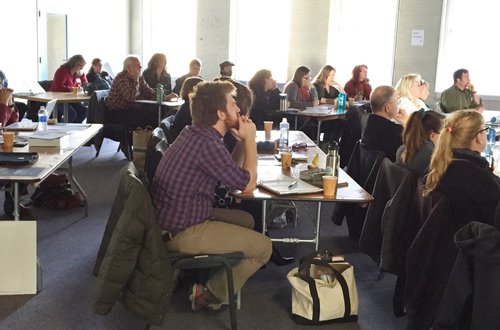by Carolyn Edlund
Artists want and need to learn skills that help in building their businesses. But is the online or in-person experience better?

I recently had a conversation with an adjunct professor who teaches International Finance and Economics to graduate students at a nearby university. The topic turned to online courses and distance learning, which is currently all the rage. Schools are developing e-courses to accommodate the needs and schedules of students everywhere.
“That trend is changing,” he said. “There is pushback now, with students wanting the live experience rather than virtual learning.”
There are clearly benefits to both. In my own experience as a speaker and workshop leader at in-person art business workshops around the country, I know the “real” experience has incredible value that you cannot get on the internet, even if an online class is taught live.
But as an online course creator, I can appreciate the convenience of that format as well. You don’t have to travel or meet a schedule. Recorded classes or packaged content is often self-paced. You can repeat sections of the course, or skip them. And they can be delivered instantly.
Still, I’m not surprised that in a digital world people are craving face-to-face interaction, not only with an instructor but with other students and peers. It’s a higher level of connection. Spontaneous discussion and personalized attention thrive in live environments.
Being part of an art community is a powerful factor in the success of creative businesses, whereas isolation is a key factor in their failure. Communities are often built online, and they can be very helpful and inspiring. But they don’t have that intangible quality of an in-person meeting. There is no substitute for shaking hands, sitting down together over coffee, or enjoying conversation with others who are equally serious about their art.
What is your experience? Have you taken online courses? Live workshops or classes? Which do you prefer, or find more effective?

I love the idea of in-person art workshops and retreats, but the majority are priced beyond what I can swing. When the workshop is $1500 or more and that doesn’t include travel, lodging, and meals, well, that quickly limits who can attend. I get that instructors need to make a living and am not knocking that–I want them to be able to make a living and thrive! However, it does sting a bit to see these amazing learning and connecting opportunities always beyond reach. It’s hard, too, when those who can attend so many of these events seem to forget not all can (the “oh, you just have to go!” comments in posts, etc.). 🙁
I would agree that very pricey events are out of reach for so many artists …. or they may be an experience to have once. If you cannot make it to a paid workshop, you might want to join an art salon, community or arts council locally, which is usually free. Just getting into a setting where people can meet and discuss their common goals and interests can be so helpful. There are quite a few very active groups – hopefully one near you!
Both methods are wonderful ways to learn but for me personally, I prefer in-person classes over online and am willing to pay more for the experience.
With “live” classes, you get the benefit of learning along side other like-minded students and an opportunity to network. One can ask the instructor questions that pertain to them and get their questions answered during or after class. And you often learn things from your fellow students that you wouldn’t in an on-line class.
I’ve purchased a lot of on-line classes and I never know what I’m going to get. With a recorded live class, the sound quality is often sub-par but the teachers are generally on point with their students and very articulate. With on-line recorded classes, many of the teachers are nervous and do things that annoy the viewer (ahs, uhs, nervous laughs) to the point it’s uncomfortable to watch.
For me, my first choice is a live class; followed by a recorded live class; then a staged on-line class. I’m not saying all on-line classes have these quirks, but the majority of the ones I’ve purchased do.
Interesting perspective, Judy. You have a great point that you often learn things from the other students in the class. That’s so true!